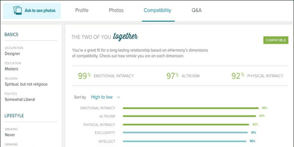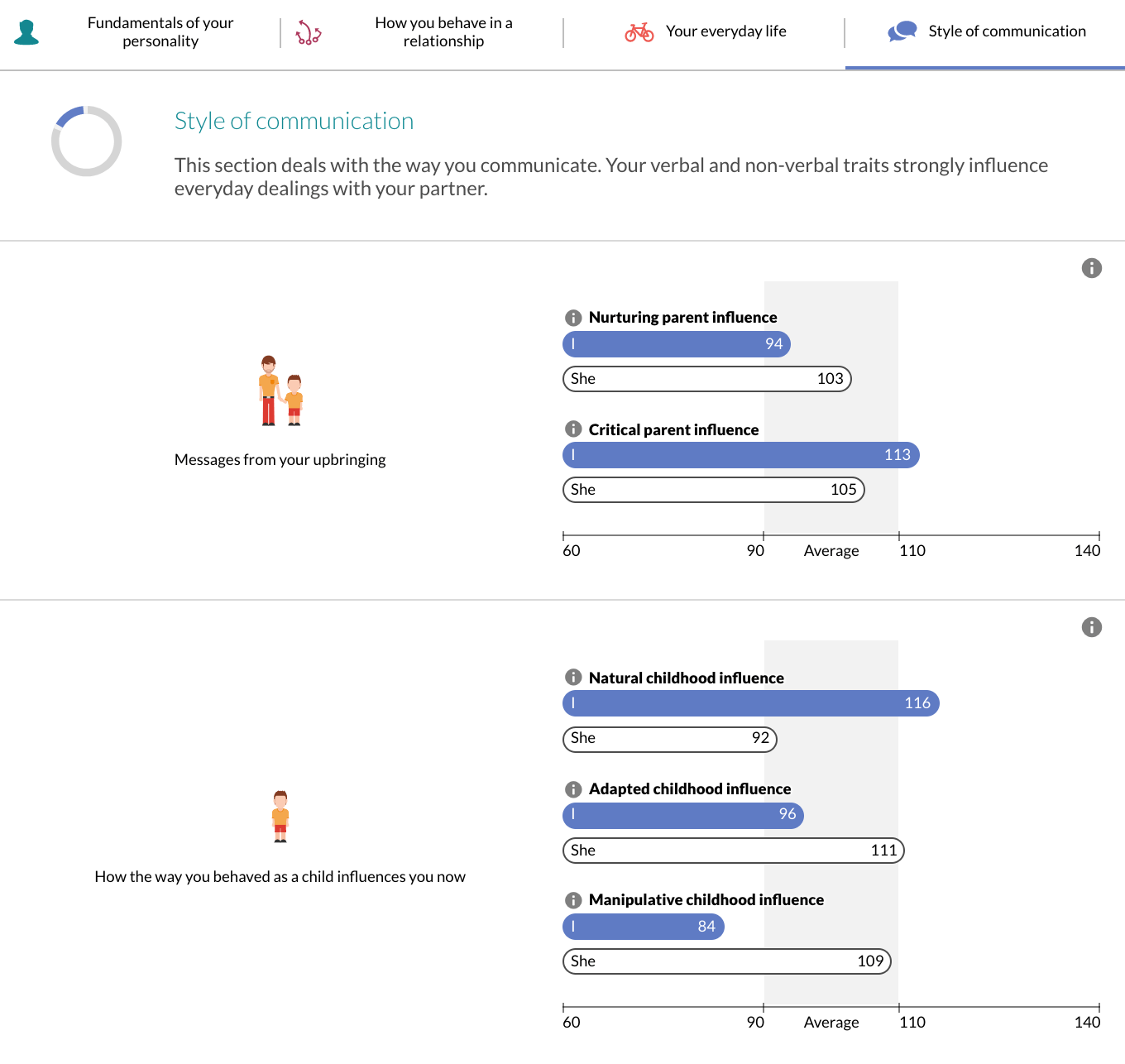
They will be able to see the matches who score at an advanced level of compatibility and also why. Reception and analysis Applicant rejection. It is estimated that about 20% of eHarmony applicants are rejected. In 2007, eHarmony stated since the site's launch, they had rejected about a million people who applied to use the service. EHarmony is an affordable dating site with a free lifetime membership. With a free account, you can take the 29 dimension personality questionnaire, get the results of that compatibility assessment, browse profiles, and even have high quality matches delivered to you.
“Spit in this tube,” I said to my husband on a recent Wednesday night.
Spitting may not be the most romantic gesture out there (though like anything else, there seems to be an associated fetish….trust me, don’t Google that) but we were doing it as a couple nonetheless.
Eharmony Quiz Questions
He took the proffered tube, but hesitated. “If we don’t get good results, does this mean you’re going to divorce me?”
What Is A Good Eharmony Compatibility Score
“No,” I said. “But I’m going to write about it in my blog.”
When Instant Chemistry’s CEO reached out to me to see if I wanted to give their “couple compatibility” test a try, I jumped at the chance. Using your DNA sample and responses to a personality quiz, Instant Chemistry looks at various genetic components and provides you with a “compatibility score”.
One of the scores is based on the HLA genes, which play a role in defining your immune system. Instant Chemistry’s website says “many other studies have confirmed that up to 40% of physical attraction can be determined through our genes alone”. I first heard about the idea of differing immune systems predicting physical attraction in early 2014. The theory goes, the more different someone’s immune system is to yours, the more attracted to them you will be. How can you tell if someone’s immune system is different? You like the way they smell.
Sparked by this research, sweaty t-shirt parties became a trend. Singles would bring in t-shirts they’d worn, which would be put in bags and marked with a number. After rating the smell of all those t-shirts, they would be matched by mutual smell appreciation.
A couple of weeks after I’d mailed in our spit tubes, I got an email saying our results had arrived. I eagerly opened the attached report, and scanned the document for our compatibility score: 70%.

This score comes from three components: bio compatibility, neuro compatibility, and psychological compatibility. Each one of those is weighted differently.
Let’s look at “bio” compatibility first. Our score was 76% (most long-term couples who have tried the kit have an average between 75% and 84%).
Compatibility Score On Eharmony

This is the one associated with those sweaty t-shirt studies: it uses the HLA (immune) differences to calculate this score. The higher the score, supposedly the higher the physical attraction.

Next is “neuro”. Our score was 81%. This one looks at serotonin, dopamine, oxytocin, and COMT. The serotonin transporter gene “moderates the association between negative and positive emotional behavior”. I have the “short” version, which allegedly means I have a strong response to emotional changes. (For that, I’ll say “duh”.) My dopamine receptor labels me as a “builder”. That makes me sensible with “good judgement”. And not very impulsive. Chris, on the other hand, was labeled an “explorer”: “adventurous” and a risk-taker.
Finally, psych: our score for this came out at 50%. A strong component of this seems to be how social you are. Although I’m an introvert, I am more social by nature than Chris; however, he’s also a very willing social partner. If I suggest it, he’s up for it. I think the questions may have overemphasized this difference.
Strangely enough, I spent very little time contemplating the “compatibility” piece of the scoring. The explanations made enough sense to me that I didn’t really dwell on it.
But I became obsessed with one aspect that had nothing to do with our compatibility: COMT. You may have heard of this one before; there has been some recent media coverage of the “warrior” v “worrier” gene. According to Instant Chemistry’s testing, I’m the one with the “warrior” and Chris the “worrier”.
I was so shocked by this I asked them to verify the tests to make sure we did not get our results mixed up, which they were kind enough to do (by checking the sex chromosome).

Obviously your genes are not the complete explanation for who you are, but I still find it incredibly hard to believe. I always have a “top 10 worry list” in my head, while Chris rarely worries about anything. Instant Chemistry’s CEO, Ron Gonzalez, did comment further on Chris’s results:
When someone carries the worrier version of the COMT gene, there are higher levels of dopamine in the brain. This is partly what causes the increase in anxiety as there are higher levels of dopamine acting on the brain. However, he also carries the 7R+ version of DRD4. This version of DRD4 is actually less sensitive to dopamine. This would mean that even though there are higher levels of dopamine, characteristic of a worrier, the excess dopamine can’t affect the brain as much because he carries DRD4 7R+ which is less sensitive to dopamine. His DRD4 gene is likely acting to partially cancel out the effect of the worrier gene.
So what do I make of all this? I found it a very interesting exercise, but I’m not sure how much it’s going to change our behavior or our relationship. I would have liked more concrete examples of how to apply the results to our day-to-day life.
I am still a fan of using the HLA component for dating: not because I think it will predict whether you will be a great couple, but it does seem to have some potential for predicting physical attraction. If you narrow down a number of people to go on first dates with, wouldn’t it be nice to know you chose someone you were likely to be more attracted to?
All in all, it was an interesting experience and I’m glad I took part. It did cause me to reexamine parts of our personalities I’d always taken for granted and look at them in a new way. What if I’m not as much of a worrier as I’ve always thought? What if Chris reacts more negatively to stress than I’ve always assumed?
I love thinking about relationships and how they work. Applying DNA analysis to this is an idea still in its infancy, but who knows, in 20 years maybe it’ll be as standard as a profile picture. In addition to listing long walks on the beach under “likes”, you can specify your preference for a partner with a 7R+ dopamine receptor gene and the “Met” version of the catechol-O-methyl transferase enzyme. Might make as much sense as dating someone because you both love Game of Thrones.